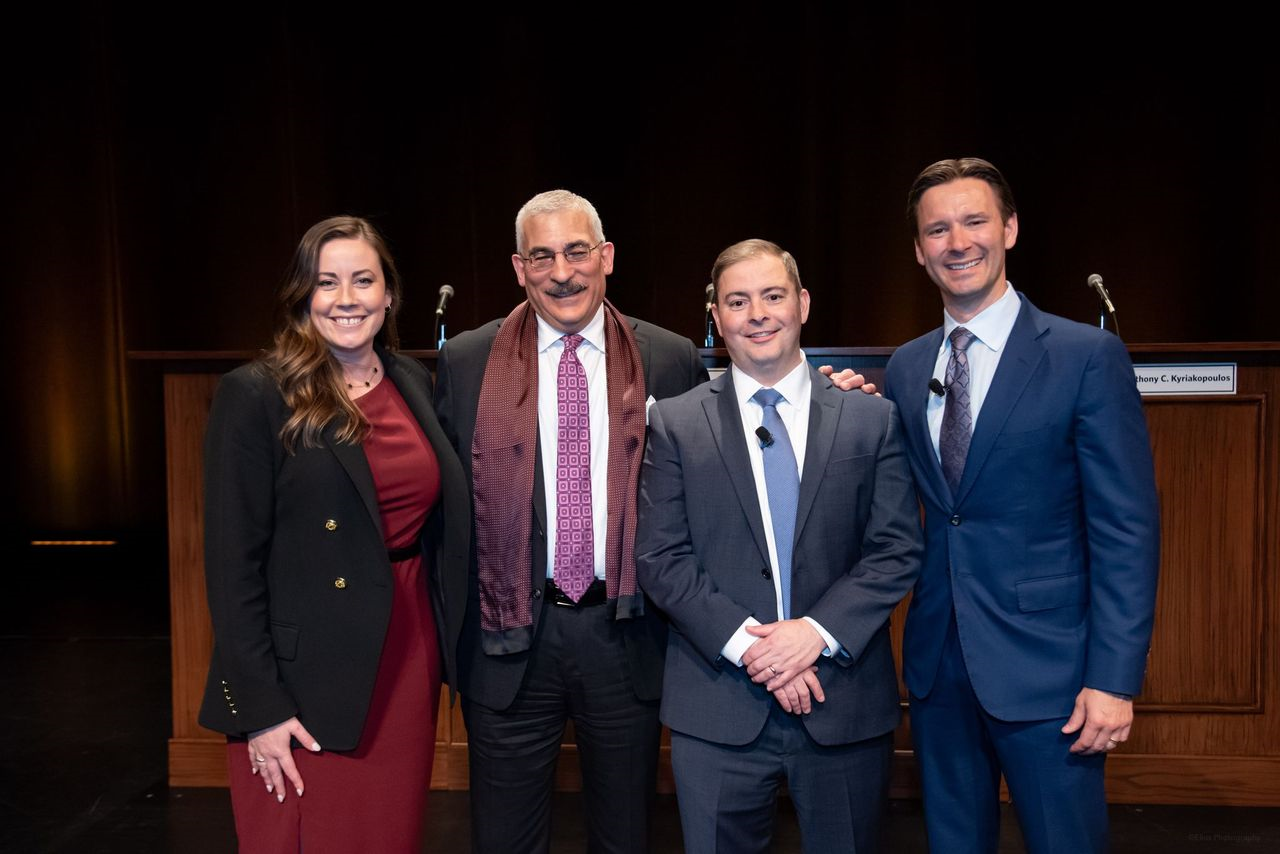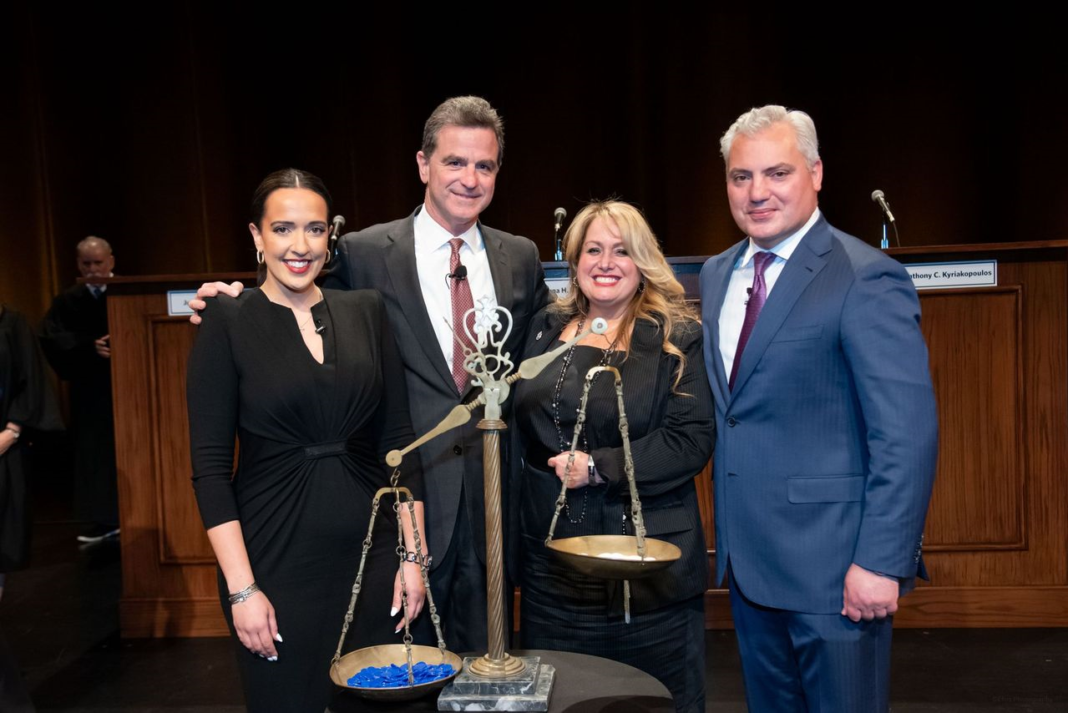”Whatever sacrifice” for democracy? Mock trial a cautionary ancient-to-modern tale
Questions surface: What constitutes “citizen,” who gets to vote?
By Terry Poulos, Special to the Hellenic News of America
Is ”whatever” it takes acceptable to preserve democracy? What about the elimination of one-quarter of a population’s voting rights? Is this not anti-democratic? While we’re at it, can a democracy vote to install a dictatorship? In times of war, do the moral and legal equations change?
There is modern precedence. The Patriot Act, US internment of Japanese American citizens during World War II. Putting aside morality, are these legal actions? In ancient times, circumstances, laws, and ethics were significantly different. Have the core values changed?
This theater of the mind pushes the envelope of modern sensibilities. Many similar conundrums confront us in 2024: Citizenship and voting rights are still being hotly debated.
The National Hellenic Museum in Chicago provokes thought well with its award-winning series of ancient mock trials, beginning in 2013. Attendees, ranging from 600 to 1000 over the years, cast votes as citizen jurors. The event is filmed live and aired 12 months after on the Chicago PBS affiliate.
On April 17 at the Harris Theater, it was Pericles’ turn to put democracy to the test. The trial was timely, and some might say a necessary exercise in today’s geopolitical climate. The following is a brief synopsis, mostly paraphrasing quotes. Hopefully, we accurately captured the spirit of the arguments.
Pericles (c. 451 BCE) was the king of the city-state of Athens, the world’s first democracy where citizens had a voice in voting on affairs of state, albeit with a king presiding as opposed to an elected president. An assembly of 5,000 (they would rotate citizens in and out periodically) would convene to establish policy and law. Democracy was still in its infancy.
The defendant, King Pericles, was afforded no immunity in 2024. He was accused of subverting his own law. Arguing that Athens was at war with neighboring city-state Sparta, Pericles feared non-Athenians who had wed Athenians might have compromised loyalties. Thus, he is alleged to have petitioned the assembly to deny those not born on Athenian soil the right to vote. Overnight, 25 percent of Athenians lost full citizenship rights.

Pericles had a problem. His own wife was not born in Athens. But citizens, including the king, could petition the assembly for an exemption. The council complied with Pericles’ petition (he was the king, after all). But there were complications.
No written records could be located to prove the original law was passed by the assembly, leading some to speculate Pericles had unilaterally decreed the law as a dictator. However, there was record of his having petitioned for his wife’s exemption. Even the prosecution did not dispute that much.
All that said, can the exemption alone be seen as credible evidence the original law was passed via vote? Is this quirk incontrovertible forensic evidence that the law was democratically enacted? Or could it be a sinister `ex post facto coverup’ by a crafty despot?
Patrick M. Collins, now in private practice and a former assistant US Attorney, delivered opening arguments on behalf of the prosecution. Alluding half-humorously to alleged efforts to subvert the outcome of the 2020 presidential election, Collins acknowledged that Athens did face “existential threats” beyond its walls, but that the real threat to democracy resided inside Athens. He implored (paraphrasing), “You cannot promote democracy by suppressing it (the vote).”
Attorney Sarah King opened for the defense (paraphrasing). “Democracy is fragile. It needs a protector. Citizenship is complex. In the USA, we define citizenship as the ‘right of soil.’ But in BC, it was always shifting.”
At this point, the prosecution’s star witness, Olympia, took the stand. Olympia is a foreign-born wife of an Athenian who claimed she was divorced as a direct result of the voting restriction. Olympia was portrayed by Chicago Judge Megan Goldish.
Attorney Patrick A. Salvi II attacked the credibility of the witness, noting that Olympia’s own son (from a previous marriage) could have been influenced to vote against funding for Athens’ war against Macedon because his father is a Macedonian general, presenting a direct conflict of interest for Athens. Olympia’s passionate pleas, however, seemed to win over the audience.
Pericles was called to the stand. He was portrayed by retired Judge Paul C. Lillios. Defense attorney Jeff Pullos was the first to question him. The following is Pericles’ own account.
(Paraphrasing) “All other city-states are ruled by dictator kings and tyrants,” asserted Pericles. “We changed the law so that Athenians must have an Athenian father and mother. At the time the law was amended, democracy was in peril…Only Athenian mothers would instill virtues of Athenian culture and law.”
Pericles reminded the audience that, while the right to vote was stricken, these citizens “could still own businesses, work freely and serve in the military,” and that the only reason he had petitioned for an exemption was to allow his own son to continue to have full citizenship rights.
“Every citizen had the right to petition for an exemption,” said Pericles, who reminded that some of his own political supporters were affected by voting restrictions and that the assembly granted exemptions to many others.
Prosecuting attorney Tinos Diamantatos, a former federal prosecutor, questioned the so-called “lost document” that is alleged to have showed the assembly passed the law. Despite the “fog of war” defense for the missing document, Diamantatos uttered the satirical denouncement (paraphrasing), “Are we supposed to believe a dog in the chorió ate the papyrus?”
Pericles responded (paraphrasing): “I would not have needed to petition for my son’s citizenship had the law not been passed by the assembly.” Regarding the law itself, Pericles issued an ominous warning, ”Whatever sacrifice to save democracy must be done!” Apparently, that sacrifice did not extend to his own son.
Katerina Alexopoulos, assistant chief counsel for the US Department of Homeland Security, gave the prosecution’s closing arguments. The following is a verbatim excerpt from her own post-event transcript.
“(Voting is) a right…that encompasses the epitome of democracy. The hardest pill for Pericles to swallow was knowing that he was going to leave this world without Athenian heirs. In Greek we have a saying, ‘Δάσκαλε που δίδασκες και νόμο δεν εκράττεις.’ Oh teacher, you teach, but you don’t follow your own rules. His line of tyranny had ended. He had no lawful heirs to carry on his legacy. And so he carved an exception for his son. Because laws do not apply to Pericles. He is above the law…No one, especially no one from within, can threaten what we as a society have built.”
And with that, the citizen audience, along with a panel of 12 select celebrity jurors and a three-judge panel, voted unanimously to convict Pericles of subverting the law.
Right or wrong, the entire affair was thought-provoking and had many of us stirring and feverishly questioning “what price democracy,” the rule of law, and what’s acceptable in peacetime and wartime. That alone made the entire event a success.
Museum trustees, led by chairman John P. Calamos Sr., are to be commended for producing this judicial crown jewel. The 2014 event was coordinated by attorney Konstantinos Armiros and recently retired Judge Anna Helen Demacopoulos, who also both serve as trustees. Radio/TV journalist and personality Andrea Darlas, yet another trustee, emceed the event.









